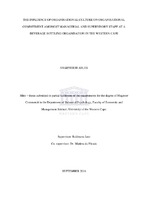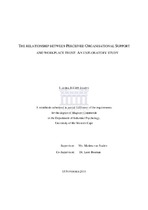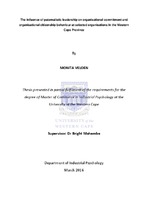The influence of organisational culture on organisational commitment amongst managerial and supervisory staff at a beverage bottling organisation in the Western Cape
Abstract
At present organisations are faced with considerable changes in the business environment due to globalisation illustrated through specialisation and individualisation in the workplace (Rastegar & Aghayan, 2012). To stay abreast of these changes, organisations attempt to gain competitive advantage within the competitive business environments they operate. The competitive advantage referred to is, enhancing the organisation's culture, so as to ensure the employees in the workplace stay committed (Acar, 2012). Dwivedi, Kaushik and Luxmi (2014) further add that organisation culture is a fundamental element to any activity in the organisation. The authors also purport that a good organisational culture, which yields self-actualisation needs such as capability development, empowerment, achievement and recognition leads to a greater level of commitment between employees. The inverse, that is, poor organisational culture, leads to lower levels of commitment with consequences such as increased employee turnover and lower productivity rates (Dwivedi et al., 2014). The purpose of this study was to examine the influence of organisational culture (sub-dimensions being, mission, involvement, adaptability and consistency) on organisational commitment (sub-dimensions being, affective commitment, normative commitment and continuance commitment). The sample was chosen by means of convenience sampling. Two hundred and thirty – six supervisory and managerial staff who were employed at a beverage company in the Western Cape partook in the study. Three questionnaires were utilised to collect the data namely, a self - developed biographical questionnaire, containing six items which was used to collect information pertaining to the demographics of the sample. The second questionnaire utilised was the Denison Organisational Culture Survey, which contained 60 items and the final questionnaire administered was Allen and Meyer's (1990) Organisational Commitment Questionnaire, which contained 24 items. The data was computed using the Statistical Programme for the Social Sciences (SPSS) software version 23 using a multiple regression technique, yielding the following results: The results indicated that a significant proportion of the variance in organisational commitment was explained by mission, involvement, adaptability and consistency. The most statistical significance predictors of organisational commitment were mission and consistency, however, mission contributed to the highest variance. Additionally, the results indicated that a significant proportion of the variance in affective commitment was explained by mission, involvement, adaptability and consistency amongst staff. Involvement, adaptability and mission were found to be significant predictors of affective commitment with involvement accounting for the highest variance. Furthermore, the results showed that a significant proportion of the variance in normative commitment was explained by mission, involvement, adaptability and consistency. Moreover, the most significant predictor of normative commitment was found to be consistency. Further findings found that a significant proportion of the variance in continuance commitment was explained by mission, involvement, adaptability and consistency amongst staff. Moreover, the results indicated that the most significant predictor of continuance commitment was mission. Lastly, limitations for the current study were presented and recommendations for future research and for the organisation were offered.
Related items
Showing items related by title, author, creator and subject.
-
The relationship between perceived organisational support and workplace trust: an exploratory study
James, Laura Juliet (2011)As organisations struggle to meet the demands placed on them by contextual challenges, they place more emphasis on relationships for effective organisational functioning. Trust is a critical component of workplace relationships ... -
The impact of an organisational capacity assessment on non-profit organisations in South Africa.
Wagner, Andre (University of the Western Cape, 2020)The research study investigated the potential impact that organisational capacity assessments can have on the long-term sustainability of non-profit organisations (NPOs). The researcher employed longitudinal research design ... -
The influence of paternalistic leadership on organisational commitment and organisational citizenship behaviour at selected organisations in the Western Cape Province
Veloen, Monita (University of the Western Cape, 2016)Achieving organisational effectiveness and sustainable growth is the ultimate goal of organisations in their quest to deliver the services required by society.




